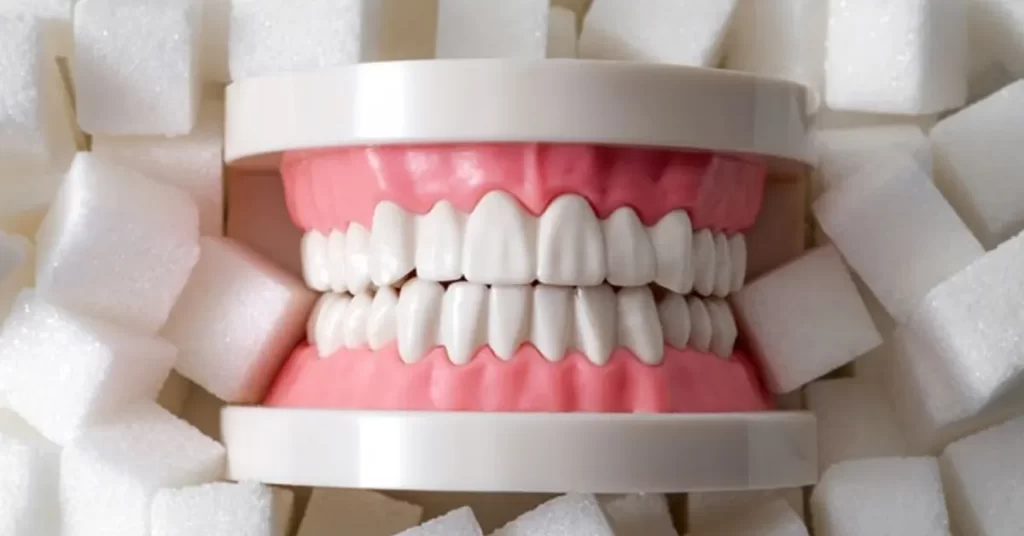When it comes to oral health, one of the most common concerns is tooth decay. We’ve all heard about it, but do we really understand what causes it and how to prevent it? In this article, we’ll delve deep into the world of tooth decay, exploring how sugar plays a significant role in its development and providing practical tips to keep your pearly whites healthy. So, let’s embark on this journey to uncover the secrets behind tooth decay and how you can maintain a beautiful smile.
The Science of Tooth Decay
Tooth decay, scientifically known as ‘dental caries,’ occurs when acid produced by bacteria in the mouth attacks the enamel and dentine of the teeth, leading to the formation of cavities. The main culprits behind this process are the bacteria found within the sticky film known as dental plaque.
When we consume sugar, it becomes a source of energy for these bacteria, which in turn release acid as a waste product. This acid gradually dissolves the enamel of the teeth, creating those troublesome holes or cavities. The result? Tooth decay.
The Sugar Connection
Sugar is a primary player in the development of dental caries. Those bacteria in dental plaque thrive on sugar, and the more they get, the more acid they produce. The acid slowly but surely wears away the enamel, causing cavities.
In fact, the World Health Organization (WHO) commissioned a comprehensive study in 2010 that showed strong evidence linking the amount of sugar consumed to the development of dental caries. The review recommended that free sugars intake should be less than 10% of our daily energy intake. However, it’s not just about today’s dental health; the effects of sugars on your teeth are lifelong. Even minor caries in childhood can have a significant impact on your oral health throughout your life. Some studies even suggest that keeping sugars to less than 5% of your daily energy intake can help minimize the risk of dental caries over your lifetime.
Insights from Scientific Research
The Scientific Advisory Committee on Nutrition (SACN) has also joined the chorus, underlining a clear connection between the consumption of sugar-containing foods and beverages and the incidence of dental caries. In their analysis, they reviewed 11 cohort studies that identified a relationship between the consumption of sugary foods and the development of dental caries in children’s deciduous dentition. The message is clear: the more frequently you consume sugar, the higher the risk of dental caries.
A Children’s Challenge
Tooth decay is particularly troublesome among children who develop a taste for sugar at an early age. In the UK, it’s a severe problem, with tooth decay being the leading cause of hospitalization among 5-9-year-olds. Shockingly, 26,000 children are hospitalized each year due to tooth decay. That’s roughly 500 children every week! This alarming statistic underscores the importance of addressing sugar consumption, especially in our young ones.
Who’s at Risk?
While everyone is susceptible to tooth decay, some groups are more vulnerable than others. Children and adolescents are at the highest risk due to their developing teeth and, often, their fondness for sugary treats. The build-up of dental plaque can begin as quickly as 20 minutes after eating, so if it’s not adequately removed, the stage is set for tooth decay. This is where your dietary choices make a significant impact.
Additionally, those who regularly consume sugary foods, especially sticky ones or those consumed between meals, face a higher risk. Smoking and alcohol consumption can also put you at risk. Furthermore, social factors play a role, as adults from lower-income households are more likely to suffer from dental caries compared to those from higher-income households.
Dietary Advice for Healthy Teeth
So, what can you do to protect your teeth and maintain good oral health? It all starts with dietary choices. Currently, we consume way too much sugar every day. Recent reviews by SACN and WHO have led to a reduction in the recommended daily sugar intake. For individuals aged 11 and above, it’s now less than 5% of your daily energy intake, which roughly translates to about 30g of sugar per day. Children between 4 and 6 should limit their sugar intake to 19g, while those aged 7 to 11 should aim for 24g.
These recommendations are significantly lower than the current average intake. Implementing these reductions in daily sugar intake can lead to a substantial reduction in dental caries and an overall improvement in oral health.
But it’s not just about sugar intake. There are other steps you can take to keep your teeth healthy:
Brush your teeth thoroughly twice a day with fluoride-containing toothpaste.
Floss daily to remove food particles and plaque between your teeth.
Reduce the consumption of sticky, sugar-containing foods, and rinse your mouth with water if you do indulge in them.
Limit snacking, as this helps reduce acid production in your mouth.
Finally, reduce your consumption of sugar-sweetened beverages, as they can be a hidden source of sugar.



